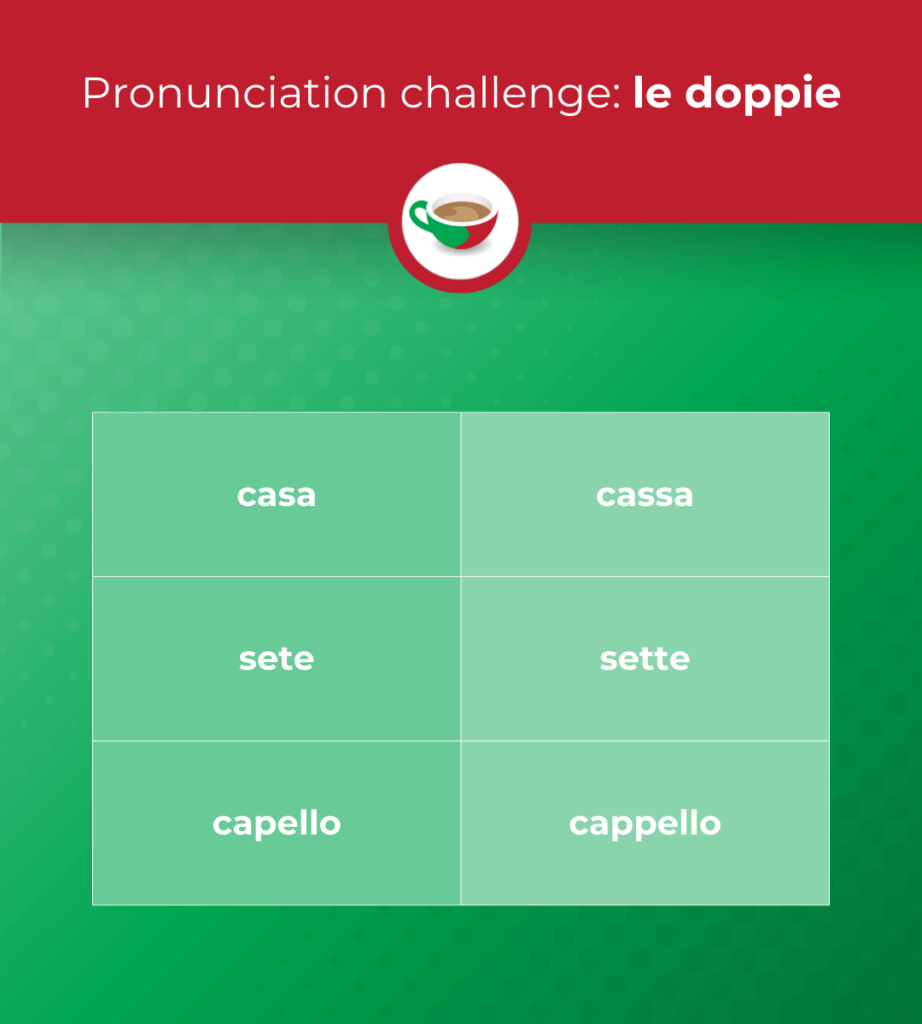Italian is renowned for its smooth and lyrical sounds. One of the intriguing aspects of Italian pronunciation lies in its double consonants – or le doppie.
In Italian, all consonants can be doubled (apart from the letter H). Even the double Q exists – soqquadro (“disarray”).
The Coffee Break Italian Show is a podcast series of bite-sized, friendly conversations in which we demystify tricky Italian language topics. In the latest episode, Mark and Maurizio share some tips on how to perfect your pronunciation of double consonants.
Mastering this phonetic feature is a way to make you sound more Italian when you speak, so continue reading to find out more, and why not listen to the podcast as you go?
The power of ‘le doppie’
Sometimes, the pronunciation of le doppie marks the difference in meaning between words. For example, notice the difference in meaning between the following words:
casa
house
cassa
box
pena
pain, suffering
penna
pen
This underscores why it is important to learn how to pronounce double consonants. Having said this, context always helps, and in most situations the person you’re speaking to will understand what you’re talking about. Even if you don’t quite pronounce le doppie correctly, most people will just be happy you’re speaking in Italian!
Tips for pronouncing double consonants
Producing the distinctive sounds of Italian double consonants requires a bit of practice. We have some tips to help you out:
Elongate the sound
When encountering a double consonant, elongate the sound while holding it in your mouth. For example, try saying sasso (“rock”), palla (“ball”) and mamma (“mum”).
Push the sound forcefully
For consonants like B, P, C, G, T and D, try pronouncing them more forcefully by pushing air through your mouth. This extra burst of air adds emphasis to the consonant. Experiment with words like babbo (“dad”) and mucca (“cow”) to feel the difference.
“Bounce” on the letter
One last tip is to imagine bouncing on the double consonant as you say the word. This mental image can help you emphasise the sound. You could even try to physically bounce on the spot to help you practise the pronunciation of double consonants!
Now, try to pronounce these two sentences. Each has the same consonant sounds, but only one has double-lettered words:
La palla è rossa.
The ball is red.
La pala è rosa.
The shovel is pink.
Regional differences
It’s important to note that sounds can also change depending on regional accents. In certain parts of Italy, vowel sounds preceding le doppie may vary.
There are rules of diction for standard Italian when it comes to the sound of vowels before le doppie, but the regional accents of many Italians might appear to contradict these rules.
The most important thing is to speak the language and then you can decide whether to adjust your vowel pronunciation depending on where you find yourself in Italy or who you are talking to.
Remember that there isn’t one specific regional variety of Italian to learn or copy – all accents and pronunciations are correct.
A pronunciation challenge
Let’s take a look at some common examples of how double consonants can change the meaning of words. Try to pronounce the following words, then listen to the podcast episode or watch the video to check how Maurizio pronounces each of them.
casa
house
cassa
till, cash desk
papa
pope
papà
dad
pappa
baby food
sete
thirst
sette
seven
cappello
hat
capello
hair
È tutto per oggi!
Keep practising your Italian pronunciation, paying attention to those double consonant sounds, and you will be well on your way to sounding more like a native speaker!
If you found this post interesting, make sure to listen to the full episode with Mark and Maurizio on The Coffee Break Italian Show. This is the series in which we look at a range of topics for Italian learners, so make sure to subscribe to our podcast feed or our channel on YouTube.
Plus! To get regular free Italian lessons in your inbox, you can sign up for our short (coffee-break-sized) email lessons that will help you improve your Italian. You will also hear from Mark, the founder of Coffee Break Languages, giving advice for language learners at any level. Sign up below!
Your pronunciation will improve with practice, so keep listening to Italian songs, watching TV and films, and trying to speak it whenever you can. We’ll be back soon with more interesting discussions about learning Italian.
Happy Coffee Breaking!





